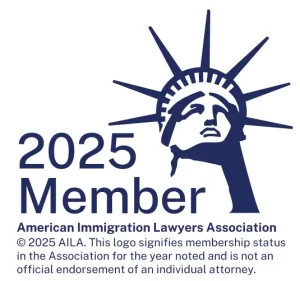Part 1 of our series on petitioner death in family immigration
The death of a lawful permanent resident (LPR) spouse creates complex immigration challenges that differ significantly from cases involving U.S. citizen petitioners. If you’re the surviving spouse of an LPR who had filed an I-130 petition for you, understanding your options is crucial for protecting your immigration future.
The Immediate Impact of Your LPR Spouse’s Death
When your LPR spouse dies, several things happen automatically to your pending I-130 petition. Unlike cases where a U.S. citizen petitioner dies, the law doesn’t provide the same automatic protections. Your approved I-130 petition doesn’t automatically convert or continue—it essentially becomes orphaned without a living petitioner.
However, this doesn’t mean your case is hopeless. You have potential pathways forward, but they require different strategies than those available to surviving spouses of U.S. citizens.
Understanding Your Current Immigration Status
If you’re currently in the United States without legal status—perhaps you entered without inspection or overstayed a visa—your spouse’s death doesn’t change your underlying admissibility challenges. You’ll still need to address these issues through the proper waiver processes.
The key difference from U.S. citizen cases lies in the financial sponsorship requirements and the complexity of proving hardship for certain waivers.
The I-601A Provisional Waiver: Your Primary Tool
Presumptive Extreme Hardship from Death
The death of your LPR petitioner establishes presumptive extreme hardship for I-601A provisional waiver purposes. This is crucial because it means USCIS will generally accept that your spouse’s death creates the extreme hardship necessary to approve your waiver of unlawful presence.
This presumptive hardship standard applies whether your deceased spouse was an LPR or U.S. citizen. The law recognizes that death creates inherent hardship that doesn’t require extensive documentation to prove.
Qualifying for the I-601A Process
To use the I-601A provisional waiver process, you must:
- Have an approved I-130 petition (which you have)
- Be the spouse of an LPR (which you were)
- Be present in the United States
- Have unlawful presence triggering the 3 or 10-year bar
- Demonstrate extreme hardship to your qualifying relative
The I-601A allows you to apply for your unlawful presence waiver while remaining in the United States, rather than applying from abroad after your consular interview.
The Critical Difference: Affidavit of Support Requirements
No I-864W Availability
Here’s where LPR petitioner death cases become significantly more challenging than U.S. citizen cases. When a U.S. citizen petitioner dies, the surviving spouse can request an I-864W (waiver of affidavit of support). This waiver eliminates the need to find a financial sponsor.
However, when an LPR petitioner dies, no I-864W waiver is available. You must have a qualifying substitute sponsor who can complete a new I-864 affidavit of support.
Who Can Serve as a Substitute Sponsor
Your substitute sponsor must be a relative of your deceased LPR spouse, specifically:
- A parent of your deceased spouse
- A sibling of your deceased spouse
- An adult child of your deceased spouse
- A grandparent of your deceased spouse
- A legal guardian of your deceased spouse
The substitute sponsor must:
- Be a U.S. citizen or lawful permanent resident
- Be at least 18 years old
- Meet the income requirements (125% of federal poverty guidelines)
- Be willing to execute the I-864
Income and Asset Requirements
Your substitute sponsor must demonstrate household income of at least 125% of the federal poverty guidelines for their household size (including you as the intending immigrant). If they don’t meet the income requirement through current income alone, they may qualify by including assets worth at least three times the income shortfall.
Humanitarian Reinstatement: An Alternative Path
If finding a qualified substitute sponsor proves impossible, you may be eligible for humanitarian reinstatement of your I-130 petition. This discretionary relief allows USCIS to reinstate your petition for humanitarian reasons related to your spouse’s death.
Requirements for Humanitarian Reinstatement
To qualify, you must demonstrate:
- The original I-130 was approvable when filed
- Humanitarian factors warrant reinstatement
- You continue to be eligible for the immigration benefit
- You have not remarried (unless the remarriage itself ended)
Benefits of Reinstatement
Successful humanitarian reinstatement can:
- Restore your priority date
- Allow continued processing of your case
- Provide a foundation for adjustment of status or consular processing
Adjustment of Status vs. Consular Processing
If You’re Eligible for Adjustment of Status
If you entered the United States lawfully (with inspection), you may be eligible to adjust status within the United States. This process requires:
- An available immigrant visa number
- Lawful entry to the United States
- A qualifying substitute sponsor
- Completion of medical examination and background checks
Consular Processing Requirements
If you entered without inspection or are otherwise ineligible for adjustment of status, you’ll need to complete consular processing in your home country. This path involves:
- Filing your I-601A provisional waiver application in the United States
- Waiting for waiver approval
- Attending your immigrant visa interview abroad
- Presenting your approved waiver at the consular interview
Practical Steps to Protect Your Case
Immediate Actions
- Gather Documentation: Collect your deceased spouse’s death certificate, marriage certificate, and any immigration documents
- Preserve Your I-130: Ensure USCIS knows about the death and your intent to continue processing
- Identify Potential Sponsors: Begin conversations with qualifying relatives of your deceased spouse
- Consult Legal Counsel: Given the complexity, professional guidance is essential
Financial Planning
The substitute sponsor requirement often becomes the biggest obstacle in LPR death cases. Start these conversations early and consider:
- Whether potential sponsors understand the long-term commitment
- Their current financial situation and stability
- Whether multiple family members might jointly sponsor
- Alternative arrangements if your first choice cannot qualify
When Documentation Becomes Critical
Proving Your Marriage
Even with an approved I-130, you’ll need to demonstrate the validity of your marriage to your deceased LPR spouse. Gather:
- Joint financial accounts and tax returns
- Lease agreements or property ownership documents
- Insurance policies naming each other as beneficiaries
- Photographs and travel documents showing your life together
Establishing the Sponsor Relationship
Your substitute sponsor must prove their relationship to your deceased spouse through:
- Birth certificates showing parent/child relationships
- Family court documents for adoption or guardianship
- Marriage certificates for step-relationships where applicable
Looking Ahead: Your Path Forward
While losing your LPR spouse creates significant challenges, understanding these requirements helps you plan effectively. The combination of presumptive hardship for your I-601A waiver, careful selection of a substitute sponsor, and preparation for consular processing can lead to successful completion of your immigration case.
The process typically takes 15-24 months from the time you file your complete application package, with most of this time spent in the United States waiting for waiver approval before traveling abroad for consular processing. Having experienced legal counsel can help navigate the procedural requirements and coordinate the timing between waiver approval and consular processing to minimize your time abroad.
Related Immigration Scenarios
This article focuses specifically on LPR petitioner death cases. We’ll be covering related scenarios in upcoming articles:
- S. Citizen Petitioner Death Cases: How the simpler I-864W waiver process works and why these cases are generally easier to resolve
- Protecting Derivative Beneficiaries: Special considerations for children and the complex rules that apply when they’re in the United States versus abroad
If you’re facing this difficult situation, remember that while the path forward is more complex than U.S. citizen cases, solutions exist. The key is understanding the requirements early and building your case methodically around the substitute sponsor requirement.
Immigration Law of Montana, P.C. has extensive experience helping families navigate the complex requirements of LPR petitioner death cases throughout Montana, North Dakota, Wyoming, and the broader Rocky Mountain region. We also assist many Canadian families facing these challenges.

